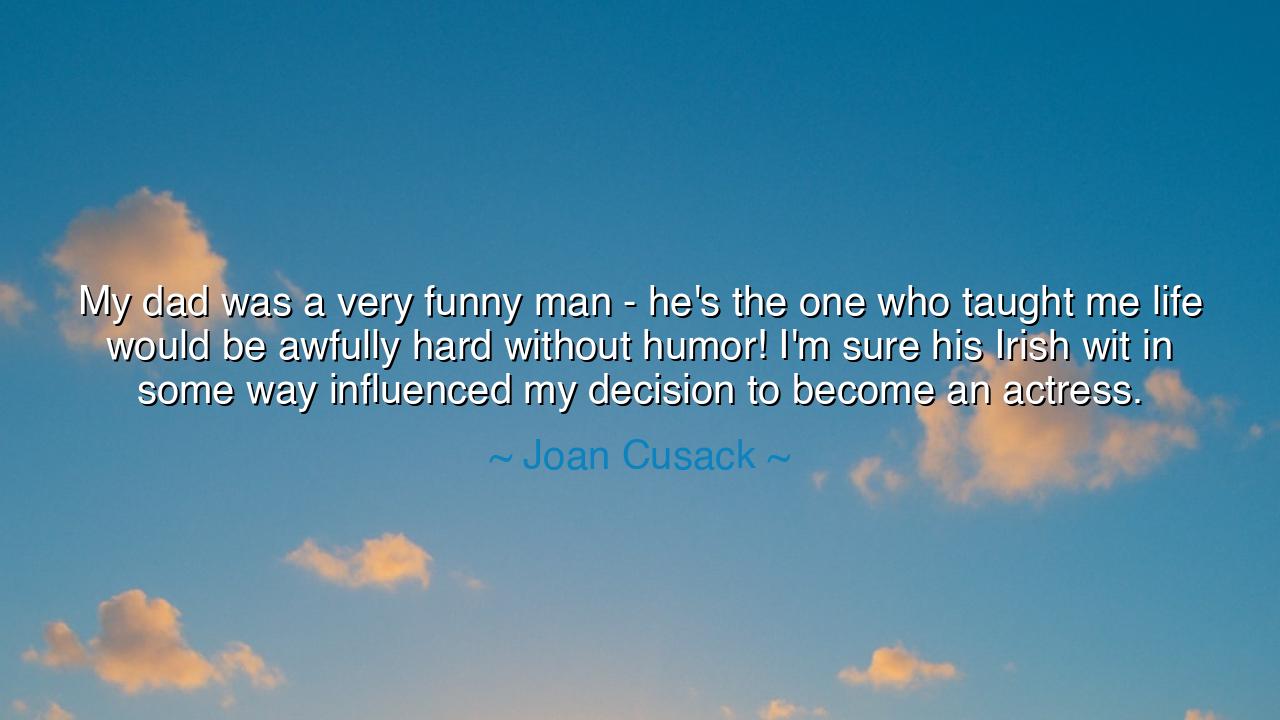
My dad was a very funny man - he's the one who taught me life
My dad was a very funny man - he's the one who taught me life would be awfully hard without humor! I'm sure his Irish wit in some way influenced my decision to become an actress.






In the eternal dance of life, where the challenges of the world collide with the joys of human existence, there are those who find their path not through grit alone, but through the radiant light of humor. Joan Cusack, in her reflection on her father, reveals a profound truth when she says, "My dad was a very funny man - he's the one who taught me life would be awfully hard without humor! I'm sure his Irish wit in some way influenced my decision to become an actress." These words carry the wisdom that humor, passed down from generation to generation, becomes not just a means of survival, but a legacy, shaping the very course of a person’s life and work.
The ancients understood this truth well—humor was seen not as a frivolous indulgence, but as a vital force, essential to navigating the complexities of the human condition. The great philosophers of Greece, like Aristotle and Socrates, while deeply concerned with the nature of virtue and reason, also recognized the power of humor. Socrates himself used irony and wit to reveal deeper truths about society and humanity. Humor, in the hands of these philosophers, was not simply for amusement, but a tool for reflection, critique, and connection. In the same way, Cusack’s father, with his Irish wit, passed down a form of humor that was not just about laughter, but about perspective—a way to view the world with lightness, even when faced with its darkest trials.
The Irish, known for their sharp wit and the ability to find joy in the harshest of circumstances, have long used humor as both survival and resilience. Irish humor is a delicate blend of irony, self-deprecation, and irreligion, a humor born of struggle and hardship, yet never allowing those difficulties to define the spirit. It is said that the Irish could laugh in the face of death, not as an act of defiance, but as a way of asserting life—of refusing to let sorrow and grief dominate their existence. This tradition of humor, handed down through generations, found its way into Cusack’s own life. Her father’s wit became a compass for her, guiding her toward a career where humor was not merely a means of entertainment, but a powerful force to express the human experience in all its complexity.
Much like the great actors and comedians of antiquity, Joan Cusack found in humor not just a way to perform, but a way to connect with the deepest truths of life. Actors in ancient Greece, such as those in the works of Sophocles and Aristophanes, understood that comedy and tragedy were two sides of the same coin. The great tragedies explored the deepest sorrows of the human condition, while the comedies revealed the absurdities of life with wit and irony. In this delicate balance of light and dark, of joy and sorrow, the ancient actors revealed the full range of human emotion. Similarly, Cusack uses her humor not just to entertain, but to speak to the truths of the human experience, to transform the mundane into something profound and the sorrowful into something bearable.
Joan Cusack’s statement is more than just an acknowledgment of her father’s influence; it is a reflection of the profound role that humor plays in shaping not just careers, but personalities and lives. The great leaders of history, too, understood the power of humor to connect and to inspire. Winston Churchill, the British Prime Minister, led his country through the darkest hours of World War II with a steady hand and a sharp tongue, often using humor to defuse tension and galvanize his people. In the face of immense pressure, he knew that laughter could be as powerful a tool as strategy in leading the nation through crisis. Cusack, like Churchill, learned that humor does not diminish the significance of life’s challenges—it illuminates them, makes them more manageable, and allows us to face them with strength.
Thus, the lesson we can take from Joan Cusack’s words is one of empowerment. Life, though filled with challenges, is not to be faced with a solemn, unyielding heart, but with a spirit that refuses to take itself too seriously. Humor becomes not an escape, but a means of survival—a way to maintain perspective in the face of adversity. The Irish wit passed down through generations, the laughter of those who have faced hardship with grace, teaches us that it is not the gravity of life that defines us, but how we respond to it. Humor, personality, and wit—these are not distractions from the truth of life, but the very tools that allow us to engage with the depths of the human experience, to laugh in the face of tragedy, and to find meaning in the absurd.
As we move forward in our own lives, let us take this wisdom to heart. Let us seek not to deny life’s hardships, but to meet them with humor, with grace, and with the ability to see the absurdity of it all. Like Joan Cusack, we must recognize the immense power of humor to shape our destinies, to bring light to the darkest places, and to keep us grounded even as we pursue our highest aspirations. For in the end, it is humor—the ability to laugh at ourselves, to see the light in the midst of the shadows—that makes life bearable, joyful, and worth living.






AAdministratorAdministrator
Welcome, honored guests. Please leave a comment, we will respond soon